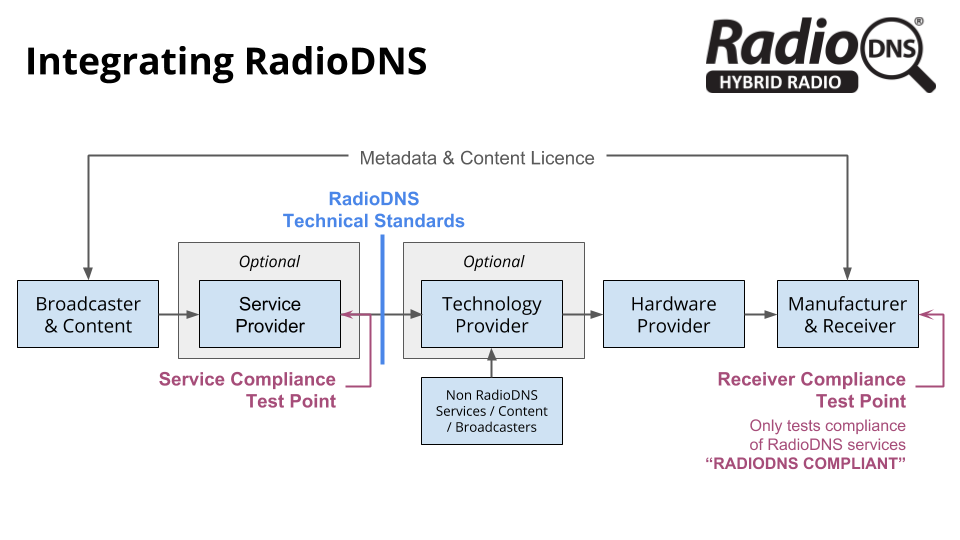Last week, Xperi (one of our members) announced that their Connected Radio platform had certified compliance with RadioDNS standards for Project Logo functionality. Whilst our testing and verification process has been running for a while, this seemed like a good time to explain why we offer this service to our members.
RadioDNS is a collection of open technology standards that allow anyone to build platforms and services around hybrid radio, without a licence or similar agreement with RadioDNS. It’s free in both senses of the word – unrestricted and without cost.
To broadcasters and manufacturers looking to buy RadioDNS solutions from technology providers we have one clear message – make sure that what you’re buying is a proper implementation of RadioDNS by looking for the RadioDNS logo. As more suppliers come to the market, some of the less scrupulous ones will offer solutions that aren’t interoperable and create technology lock-ins.
RadioDNS certification is a service we offer to our members that allows them to test their implementations against a reference implementation, and if they pass, receive certification. Once certified, a provider is allowed to use the RadioDNS logo in the marketing of their service or platform. So if you see the RadioDNS logo alongside an implementation, it means it’s been verified as working correctly.
There’s some points to be aware of:
- Testing and validation isn’t exhaustive, so you should make sure that your technology provider will make good for free any faults that they find in respect to implementing our standards
- Technology providers aren’t required to implement all of the RadioDNS standards – there’s a lot of them. So check the details to see what functionality has been verified with RadioDNS, and what might not be.
- Some technology providers might offer different levels of RadioDNS service. Ask how much it will cost you if you want to enable more functionality than their baseline offering.
We currently offer automated testing of client implementations (that’s radio receivers), and we’ll be implementing automated testing of server implementations (which is what radio stations use) during 2018.
Automated Fault Reporting
Once we’ve have rolled our both client and server testing, we’ll also enable automated fault reporting. If someone spots a problem with a RadioDNS service on a receiver, the manufacturer can use the platform to work out if the problem is with their client implementation, or a fault at the broadcaster. If it’s a broadcaster fault, then they can raise a fault report quickly and directly with that broadcaster. We think this is valuable to manufacturers, and helps improve the quality of RadioDNS powered experiences.
Licensing of Broadcaster Content and Metadata
Certification tests the technical performance of the system, including functionality like expiration of assets and documents. This will sit alongside the requirement for manufacturers to abide by licences offered by broadcasters for their metadata and content, which we’ll explain separately.

This diagram explains how everything fits together; the licence for metadata and content offered by a broadcaster to a manufacturer; the compliance of the technology providers to their customers; the test points for compliance, and the ultimate protection of the interface between both systems using our open standards.
So look out for RadioDNS certified solutions from technology providers when you’re choosing to invest in hybrid radio. It’s your guarantee of durability and interoperability.